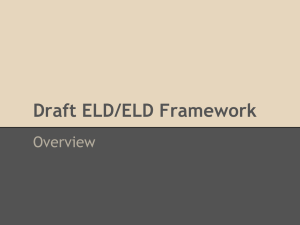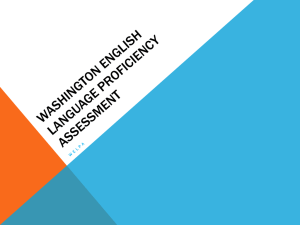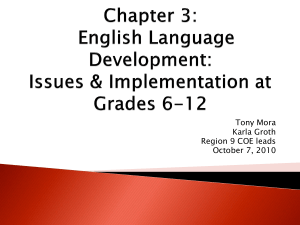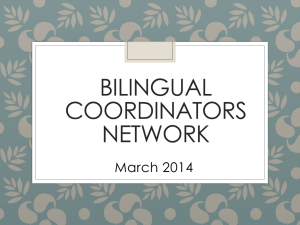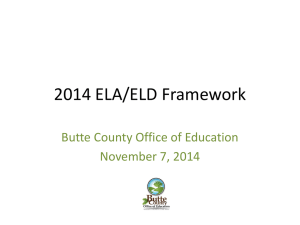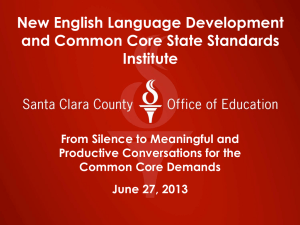eld standards project overview - MAS: Multilingual Academic Support
advertisement
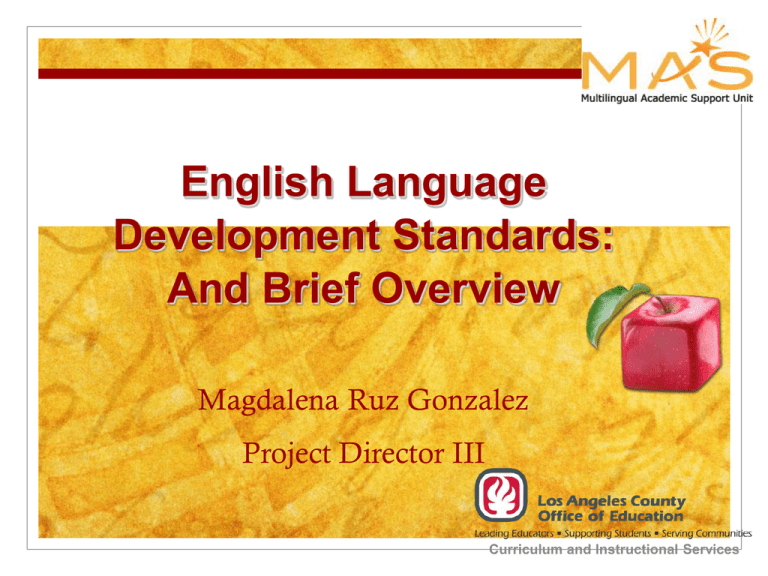
English Language Development Standards: And Brief Overview Magdalena Ruz Gonzalez Project Director III Curriculum and Instructional Services GOALS FOR CA ELD STANDARDS OVERVIEW 1. To review the critical components of language in the state ELA Common Core as it relates to language acquisition, text complexity, and academic language, the underpinnings of the ELD Standards. 2. To understand the shifts to the new ELD standards and the role of language in the process of attaining literacy. 3. To understand how ELD Standards focus on meaning and interaction first, then knowledge about language and how it works. 4. To explore implications for current ELD programs, curriculum, and instruction. 2 Use of The CA Common Core ELD Standards “…serve as the focal standards in settings specifically designed for ELD - such as designated ELD instruction in secondary school or designated block of time for ELD in elementary school where Els are grouped by English language proficiency level.” From: Appendix B The CA ELD Standards, Part II: Learning About How English Works, p. 18 3 Implications of ELA CC for ELD Standards Uncover and delineate language uses in CCSS: Social and general/discipline-specific academic, e.g. Obtain information, request clarification Demonstrate understanding, confirm being understood Build on others’ & articulate own ideas Construct explanations, engage in arguments Express target language uses in progressions Help teachers appropriately scaffold & support language used for content knowledge and action Help ELD assessment developers design appropriate tasks to measure growth Theoretical and Research Base Theoretical Base Socio-cultural and socio-linguistic approaches Genre and meaning based approaches Substantial section on scaffolding for ELs Research Base Benefits of L1 instruction Effective instructional practices KEY SHIFTS IN ELD STANDARDS 1999 CA ELD Standards From the idea of… Instruction in ELD that is separate from and isolated from instruction in ELA or that is indistinguishable from ELA. 6 To the Understanding of… Dedicated instruction in ELD that build into and from instruction in ELA and literacy in content areas. - from WestEd and CDE WE NOW HAVE 3 PROFICIENCY LEVELS! Debrief At your table, discuss the key ideas from this video. 8 Part I: Interacting in Meaningful Ways Communicative Modes: A. Collaborative (engagement in dialogue with others) 1. Exchanging information/ideas via oral communication and conversations 2. Interacting via written English (print and multimedia) 3. Offering opinions and negotiating with/persuading others 4. Adapting language choices to various choices to various contexts Part I: Interacting in Meaningful Ways B. Interpretive (comprehension, and analysis of written and spoken texts) 5. Listening actively and asking/answering questions about what was heard 6. Reading closely and explaining interpretations/ ideas from reading 7. Analyzing how writers use vocabulary and other language resources Part I: Interacting in Meaningful Ways C. Productive 9. Expressing information and ideas in oral presentations 10. Composing/writing literary and informational texts 11. Supporting opinions or justifying arguments and evaluating other’s opinions or arguments 12. Selecting and applying varied and precise vocabulary and other language resource Part II: Learning How English Works Organization of Part II A. Structuring Cohesive texts B. Expanding and enriching ideas C. Connecting and condensing ideas LET’S LOOK AT ELD STANDARDS Corresponding ELA Common Core Writing K,1-3: Use a combination of drawing, dictating, and writing to narrate a single event or several loosely linked events, tell about the events in the order in which they occurred, and provide a reaction to what happened. Writing 5: With guidance and support from adults, respond to questions and suggestions from peers and add details to strengthen writing as needed. Part III: Foundational Literacy Skills Research on English Learners -ELs benefit from reading foundational skills instruction -Oral English proficiency is crucial for English literacy -Native language literacy facilitates English literacy learning Reading Foundational Skills Alignment Charts -Student language and literacy characteristics -Considerations for literacy foundational skills instruction -CA Common Core Reading Standards: Foundational Skills Alignment Charts: k-5, by grade and 6-12, by grade span ELD Vignette in the Middle Grades At your table, read the scripted observation of an ELD unit. Read the poem, scaffolded sentence frames and model poem. Jigsaw the script and find evidence of the ELD standards embedded in your assigned day of observation. 16 ELD STANDARDS PROJECT OVERVIEW The Project Overview is a guide from which teachers can develop lessons. It incorporates the ELD standards, language objectives, academic vocabulary, scaffolded academic language, text types and graphic organizers. The Project Overview addresses the skills needed to meet the outcomes of the Smarter Balance Claims. The Project Overview is based on Project Based Learning 17(PBL- bie.org) Next Steps for CA in CCSS Implementation ELD standards revised & approved (2012) ELD implementation plan approved (2013) ELD professional development materials produced (201314) ELA/ELD Curriculum Framework developed by Instructional Quality Commission (2014-15) SBAC assessment developed (2014-15) Next-generation ELD assessment developed (2015-16) Resources Stanford University “Understanding Language” http://ell.stanford.edu/papers CDE ELD Panel RESOURCES http://www.cde.ca.gov/sp/el/er/eldstandards.asp Dr. Kenji Hakuta, On ELs and the Common Core: Closing the Gap http://www.youtube.com/watch?v=PY2fhP8Q0OY
